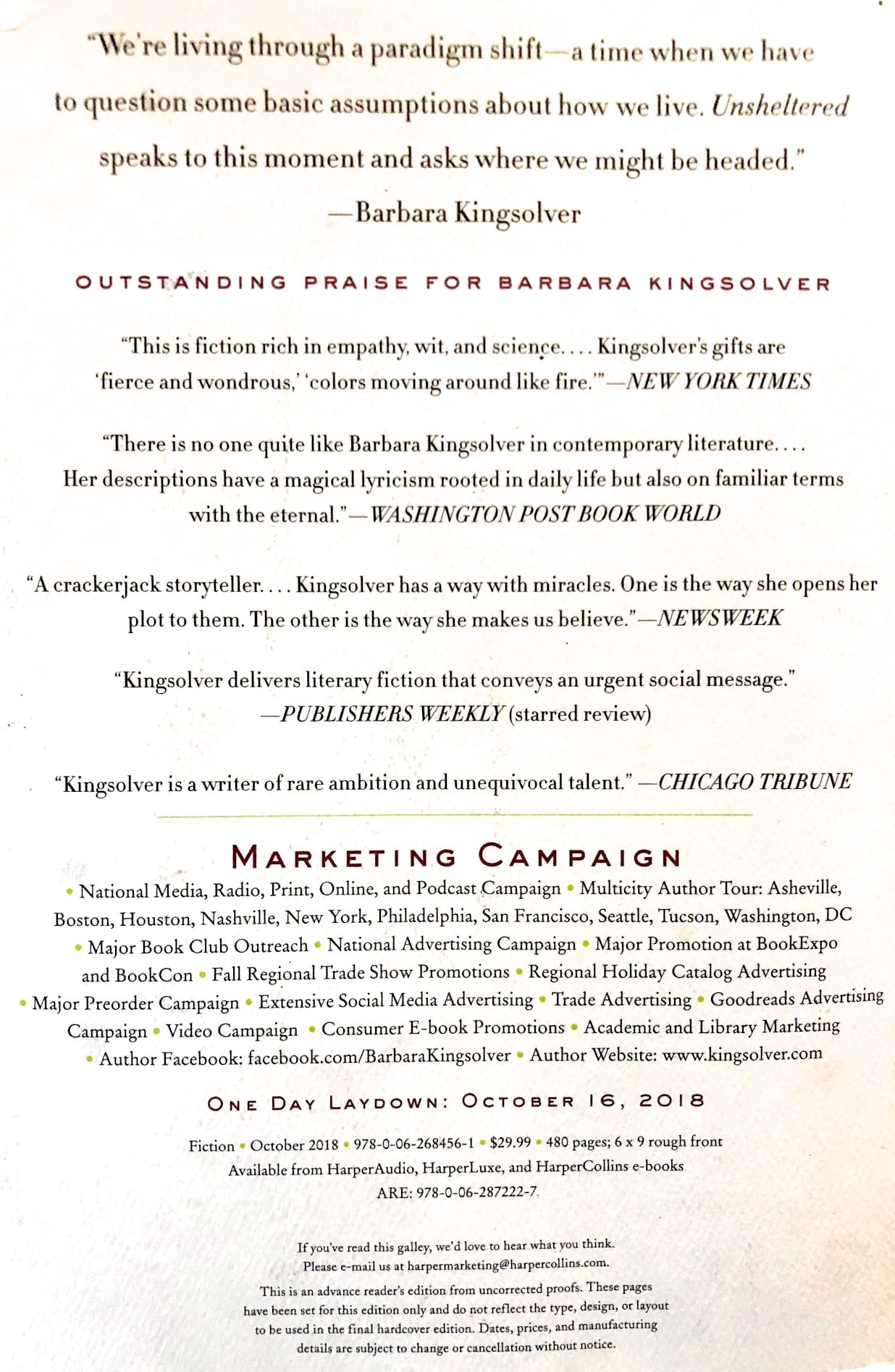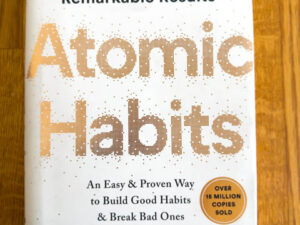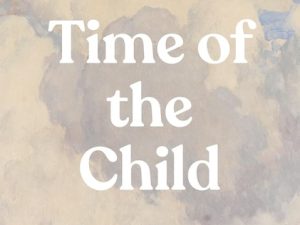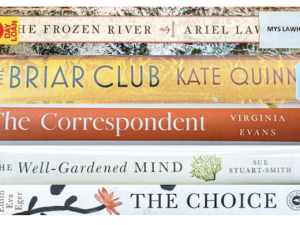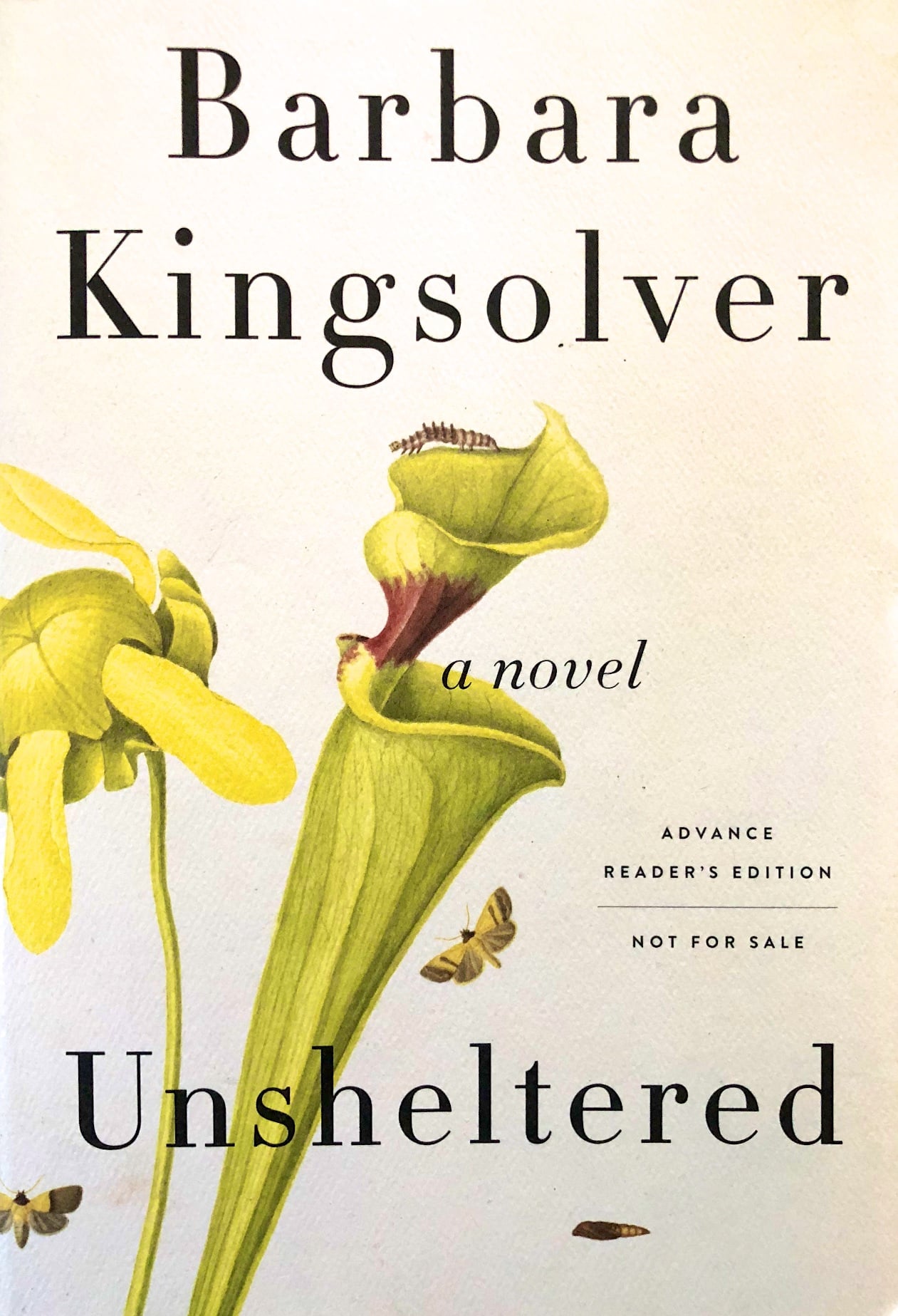
–
I feel blest to have been able to read an “advance reader’s copy” of this next book by a favorite author of mine. The book will come out in October (you can pre-order it here).
I have long been a fan of Barbara Kingsolver. Her novel Flight Behavior was reviewed here on this blog, as was The Lacuna (reviewed by me here) that I didn’t like as much. However, one of my favorite novels of all time was her book Prodigal Summer. I really liked this new one too, although I liked both Flight Behavior and Prodigal Summer better. Even though I don’t think this one is her best, I still give it five stars. It is certainly of this present moment, more than anything else I’ve read in a long time.
This author weaves “the issues of the day” into her writing, which is why I like it. I also happen to agree with her world view and her politics, which include concern about global warming and an urgent need to make different choices for sustainability. This new book is set as the current president was running for office, and discusses how the mass populace has been “sheltered” from the facts of the dire global situation.
She writes this novel from two perspectives, contemporary times in a falling apart house– which is an analogy for the state of the world– and 145 years earlier with a former inhabitant of the same crumbling address. All those years ago Thatcher Greenwood, the local science teacher, befriends his neighbor Mary Treat who is a scientist collaborator and corespondent of Charles Darwin’s. Similar to today when we seem unable or unwilling to face the facts of scientific discovery, no one wants to believe in the theory of evolution.
This is a novel, and there is a story here on multiple levels, with a plot and conclusion. The content does not ring preachy; issues come up as they would in conversation, but come out of the mouths of characters who you understand would be saying those things. Her metaphorical parallels and poetic brilliance are there for those who want to recognize it, but do not hijack the storyline.
Here are some bits in the book to give you a taste:
- “Zeke embodied the contradiction of his generation: jaded about the fate of the world, idealistic about personal prospects.”
- “Your charge is to lead them out of doors. Teach them to see evidence for themselves, and not to fear it.”
- “…complexity gives way to the simple.”
- “Beautiful people like to claim looks didn’t matter, while throwing that currency around like novice bank robbers.”
- “A mother’s unfulfilled ambitions lie heaviest on her daughters.”
- “Willa contented herself with the personable pines. They wore their rough bark like crocodile hide and held their needles upright like tasselly hands on long, curved arms, like Dr. Seuss creatures offering some warning chorus everyone needed to hear.”
- “The guys in charge of everything right now are so old. They really are, Mom. Older than you. They figured out the meaning of life in, I guess, the nineteen fifties and sixties. When it looked like there would always be plenty of everything. And they’re applying that to now. It’s just so ridiculous.”
- “…the secret of happiness is low expectations.”
- “You and Dad did your best. But all the rules have changed and its hard to watch people keep carrying on just the same, like it’s business as usual.”
- “One percent of the brotherhood has their hands on most of the bread. They own the country, their god is the free market, and most people are so horrified they won’t even question the system. If it makes a profit, that’s the definition of good. If it grows, you have to stand back and let it. The free market has exactly the same morality as a cancer cell.”
Taking a stand for what is right comes with a cost, but not doing so comes with a larger one. Both inhabitants of the untenable house, both then and now, have to learn this. Becoming “unsheltered” in the end is likened to thriving as a redwood tree, free to grow in the fresh air of authenticity and survival, which is not a terrible thing to be avoided.
This book does make me wonder what is the purpose of doing art in a world where people need to streamline belongings, don’t have wall space, and the great museums of the world will be under water. How are my pastels going to fare in the cataclysmic weather extremes to be expected? In a future world of barter and scarcity, maybe art will become currency, similar to how the navaho rug did in this book. Christian Science, on the other hand, can rear its head as more practical, accessible, and necessary than ever in these future times, when help will be sorely needed and material solutions lacking.
Anyway, I recommend reading this book when it comes out. We all need to deeply hear the message here. And I recommend reading it when you have time afterwards to go through old boxes and get rid of stuff. Because by the end of this book, you’ll want to. And that’s not an urge that I get that often, so chalk it up to effective, truthful writing.
–
